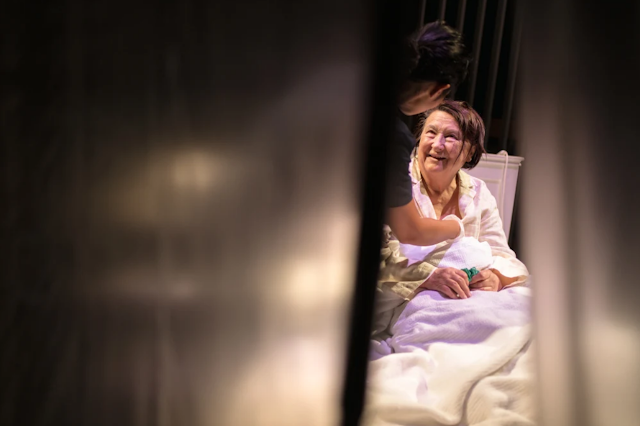It’s 2019. A private aged-care facility.
Helen, a bed-bound
elderly woman, talks with her son and daughter-in-law about getting an upgrade
on her television package. It’s her only connection to the outside world and
otherwise all she’ll binge is network detective shows. There was an episode about
an old woman who disappeared from her nursing home and she wasn’t missed for
days.
A young
support worker, Sandhya, comes in to give Helen a bath and that’s enough of a
prompt to get her visitors to leave for the day. They’ve got things to do at
home, after all. And that’s why they’ve moved Helen into aged care, because
someone else can look after her there.
The scene
between Helen and Sandhya is played behind plastic sheeting, both evocative of
hospital curtains and also nothing like them. We can see Sanhya tending to
Helen, cleaning her, massaging her, helping Helen to be as comfortable as
possible – all while Helen makes passive aggressive comments about Sandhya’s
heritage. An old woman being helped in her final years by a woman of colour,
whose life experience is entirely different.
This moment
is the heart of the play and probably the most clear and concise in its drama
and purpose. It’s touching and moving; Helen needs help and is glad of it,
since she feels like her son has abandoned her. But she doesn’t treat Sandhya
well and, as we learn later, the young woman is stuck in this job, desperate to
keep it to attain permanent residency in Australia. She’s making just enough money
to live in a share house and send some to her family back in India.
Outside of
the nursing home, we meet Sandhya’s friend Neela, and later, an
Indian-Australian doctor, Priya, who is in charge of the aged-care facility
where Sandhya works and where we discover Helen has recently died. Her death is
under review and investigation.
Telling one
story from multiple points of view is a potent idea; we all bring our own
backgrounds and experiences to a situation. Our relative power, influence and
privilege colours how we act and react. Sandhya is scared for her job and the
small life she has carved out in Melbourne. Neela has escaped to the Gold Coast
to get away from thinking about Helen’s death. And Priya is worried about the
reputation of her facility, but not as much as her husband, James, who really
wants her to foist all responsibility on the untrained care workers.
Crocodiles, the play, feels unfinished. Not
just because the end appears out of nowhere, but because the rich and important
ideas inside the premise don’t feel adequately explored. The microaggressions
between patient and low-paid workers (mirrored later between Doctor and
UberEats delivery driver) paint a portrait of this situation that is fascinating
but doesn’t add up to anything in a dramatic sense.
There is a
lot of great detail about the differences between Australian and Indian
culture, especially with regard to how we treat our elderly relatives, but it
doesn’t lead anywhere.
And the
production feels rough around the edges. The transitions are slow. The show
seems dwarfed by the big space it’s in. And after a show stop for technical
difficulties on the night I saw it, everyone felt a bit out of sorts. The tone
of the show is odd, never settling, always trying out new things.
The cast,
who are normally all top notch, didn’t bring the kind of spark I expect from
them. Theatre company, Elbow Room, produce wonderful independent theatre every
year in Melbourne and have for a long time. This show did not reach the quality
I expect from their work.
Throughout
the show, the passage of time is delineated by projected text. As we watch the
dates march through 2019, as the investigation slowly progresses, I kept
thinking the play might reach 2020 and the absolute disaster that the pandemic
wrought on the aged-care sector. The play was conceived of pre-pandemic and its
central ingredient – low-paid care-workers being ground up by the system – is
still a vital topic to be discussed.
But it’s
hard to not watch them get closer and closer to the disaster and have the play
just end. I know this play isn’t about the pandemic but fixing it so explicitly
in 2019 set up an expectation that just wasn’t delivered on. Perhaps if the
dates weren’t there at all, I wouldn’t have been waiting for something to be
made out of them.
Crocodiles circles around some great ideas,
but never lands on them. It feels like a work-in-progress that needs to find
clarity in further development.
- Keith Gow, Theatre First
Crocodiles continues at Northcote Town Hall until June 4.
Photo: Cameron Grant

Comments